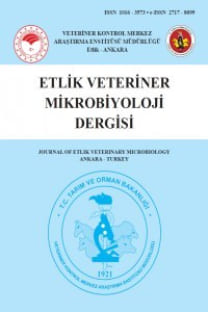Dondurulmuş çiğ etlerde Salmonella spp. prevalansı ve mevsimsel dağılımı
Barış ÖZ, Erdem ÖRMECİ, Naim Deniz AYAZ, Salmonella, mevsimsel dağılım, tavuk eti, hindi eti, sığır eti, 2010, Etlik Veteriner Mikrobiyoloji Dergisi
Prevalence and seasonal distribution of Salmonella spp. in frozen raw meats
Beef, chicken meat, Salmonella, seasonal distribution, turkey meat.,
___
- Anonymous, (2002). International Organization for Standardization (ISO). Microbiology of food and animal feeding stuffs-Horizontal method for the detection of Salmonella spp. ISO 6579.
- Bohaychuk VM, Gensler GE, King RK, Manninen KI, Sorensen O, Wu JT, Stiles ME, McMullen LM, (2006). Occurrence of pathogens in raw and ready-to-eat meat and poultry products collected from the retail marketplace in Edmonton, Alberta, Canada. J Food Prot. 69, 2176-2182.
- CDC (Centers for Disease Control and Prevention), (2001). Preliminary FoodNet data on the incidence of foodborne illnesses–selected sites, United States, 2000. Morb Mort Weekly Rep. 50, 241–246.
- Chittick P, Sulka A, Tauxe RV, Fry AM, (2006). A summary of national reports of foodborne outbreaks of Salmonella Heidelberg infections in the United States: clues for disease prevention. J Food Prot. 69, 1150–1153.
- D’Aoust JY, Maurer J, (2007). Salmonella species. Doyle MP, Beuchat LR. eds. Food Microbiology: Fundamentals and Frontiers, 3rd edition. Washington, D.C.: ASM Press. p. 187-236.
- Eblen DR, Levine P, Rose BE, Saini P, Mageau R, Hill WE, (2005). Nationwide microbiological baseline data collected by sponge sampling during 1997 and 1998 for cattle, swine, turkeys, and geese. J Food Prot. 68, 1848-1852.
- Erol İ, (1999). Incidence and serotype distribution of Salmonella in ground beef in Ankara. Turk J Vet Anim Sci. 23, 321-325.
- Erol İ, (2007). Gıda Hijyeni ve Mikrobiyolojisi. Ankara: Pozitif Matbaacılık Ltd. Şti., p 60-70.
- İşeri Ö, Erol İ, (2009). Hindi etlerinden kaynaklanan başlıca bakteriyel infeksiyon ve intoksikasyonlar. Ankara Üniv Vet Fak Derg. 56, 47-54.
- Jay JM, Loessner MJ, Golden DA, (2005). Modern Food Microbiology. 7th edition. New York: Springer Science and Business Media.
- Jorgensen F, Bailey R, Willins S, Henderson P, Warcing DR, Bolton EJ, Frost JA, Ward L, Humphrey TJ, (2002). Prevalence and numbers of Salmonella and Campylobacter spp. on cow, whole chicken in relation to sampling methods. Int J Food Microbiol. 76, 151-164.
- Kegode RB, Doetkott DK, Khaitsa ML, Wesley IV, (2008). Occurrence of Campylobacter species, Salmonella species and generic Escherichia coli in meat products from retail outlets in the fargo metropolitan area. J Food Safety. 28, 111-125.
- Little CL, Richardson JF, Owen RJ, De Pinna E, Threlfall EJ, (2008a). Prevalence, characterization and antimicrobial resistance of Campylobacter and Salmonella in raw poultry meat in the UK, 2003-2005. Int J Environ Health Res. 18, 403-414.
- Little CL, Richardson JF, Owen RJ, De Pinna E, Threlfall EJ, (2008b). Campylobacter and Salmonella in raw red meats in the United Kingdom: prevalence, characterization and antimicrobial resistance pattern, 2003-2005. Food Microbiol. 25, 538-543.
- Mead PS, Slutsker L, Dietz V, McCaig LF, Bresee JS, Shapiro C, Griffin PM, Tauxe RV, (1999). Food-related illness and death in the United States. Emerg Infect Dis. 5, 607-625.
- Oliveira SD, Rodenbusch CR, Ce´ MC, Rocha SLS, Canal CW, (2003). Evaluation of selective and non-selective enrichment PCR procedures for Salmonella detection. Lett Appl Microbiol. 36, 217–221.
- Orji MU, Onuigbo HC, Mbata TI, (2005). Isolation of Salmonella from poultry droppings and other environmental sources in Awka, Nigeria. Int J Infect Dis. 9, 86–89.
- Sarımehmetoğlu B, Küplülü Ö, Erol İ, Özdemir H, (1996). Tavuk kesimhanelerinde Salmonella kontami-nasyonu ve serotip dağılımı. Ankara Üniv Vet Fak Derg. 43, 85-90.
- Scuderi G, Fantasia M, Filetici E, Anastasio MP, (1996). Foodborne outbreaks caused by Salmonella in Italy, 1991–1994. Epidemiol Infect. 116, 257–265.
- Tauxe RV, (2002). Emerging foodborne pathogens. Int J Food Microbiol. 78, 31-41.
- Uyttendaele M, De Troy P, Debevere J, (1999). Incidence of Salmonella, Campylobacter jejuni, Campylobacter coli, and Listeria monocytogenes in poultry carcasses and different types of poultry products for sale on the Belgian retail market. J Food Prot. 62, 735–740.
- Zhao C, Ge B, Villena JD, Sudler R, Yeh E, Zhao S, White DG, Wagner D, Meng J, (2001). Prevalence of Campylobacter spp., Escherichia coli, and Salmonella serovars in retail chicken, turkey, pork, and beef from Greater Washington, D.C., Area. Appl Environ Microbiol. 67, 5431-5436.
- ISSN: 1016-3573
- Yayın Aralığı: 2
- Başlangıç: 1960
- Yayıncı: Veteriner Kontrol Merkez Araştırma Enstitüsü Müdürlüğü
Kuduz teşhisi için ulusal laboratuvarlar arası ring test (floresan antikor tekniği) - 2009
Hikmet ÜN, Nil ÜNAL, Orhan AYLAN, Selim TUNCER
Malathion’un ratların ince bağırsak dokusu üzerine etkisi ve vitamin C ve E’nin koruyucu rolü
Filiz DEMİR, Suna KALENDER, Yavuz ULUSOY, Fatma Gökçe UZUN
Dondurulmuş çiğ etlerde Salmonella spp. prevalansı ve mevsimsel dağılımı
Naim Deniz AYAZ, Erdem ÖRMECİ, Barış ÖZ
Ege Bölgesi kültür balıklarında Gram pozitif bakteri infeksiyonlarının incelenmesi
Serap SAVAŞAN, Saadet GÜRPINAR
Vero hücrelerinde ısıya dayanıklı sığır vebası aşı üretimi
A. Burak GÜNGÖR, Süreyya YÖNDEM, İlkay DEMİRHAN, Elvin ÇALIŞKAN, Özden KABAKLI
